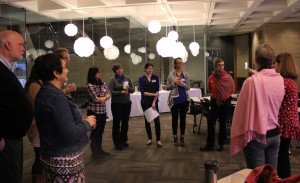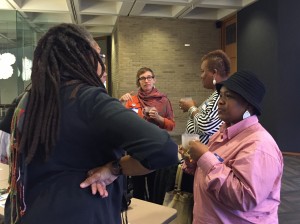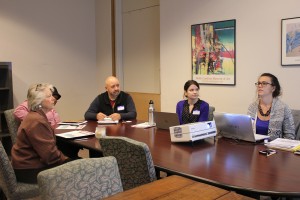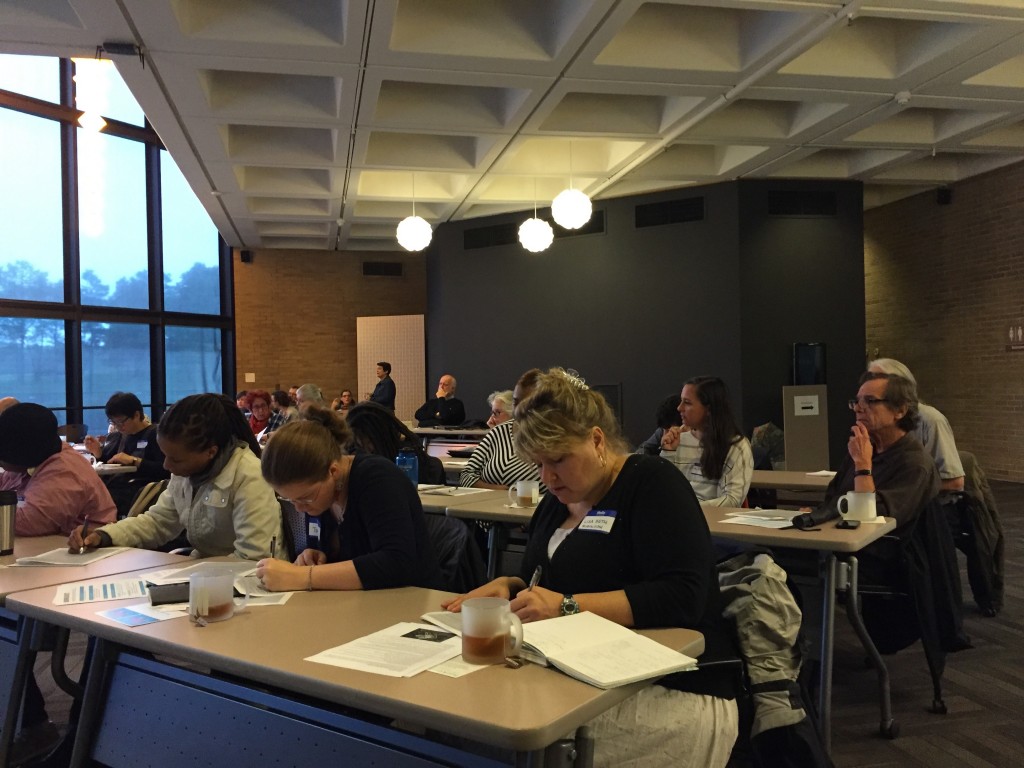Early Saturday morning, Cherryl T. Cooley, a poet, playwright and fiber artist, greeted the Artist Studio Archives team as she entered the large conference room at the North Carolina Museum of Art (NCMA), the earliest of the artists selected to participate in the first Artist Studio Archives (ASA) workshop.
The team for this first session was comprised of Heather Gendron, former UNC Sloane Art Library Director and current Director of the Haas Family Arts Library at Yale University; UNC Music Librarian Philip Vandermeer; NCMA conservation technician Stacey Kirby; UNC Art Department and SILS faculty members Denise Anthony, JJ Bauer, and Carol Magee; Sloane Library Temporary Research Assistant Amelia Holmes; 2nd year Fellows Colin Post and Kimberley Henze; and 1st year Fellows Elizabeth Grab, Kelsey Moen, Fanny Huang Ouyang, and myself. Funded by the Institute of Museum and Library Services, the workshop was the result of a year’s planning by the 1st year Fellows and UNC team members.
As I spoke to Cherryl before the session began that morning, she said she felt fortunate to participate in the workshop during a time in her career when her conceptions about her own practice and personal archives are coinciding with her ambition to work with other artists on issues of legacy, estate, and intellectual property. She described being particularly spurred to action by witnessing how the legacies of artists she admires are handled after their deaths. As an example, she expressed dismay at the piecemeal sale of Maya Angelou’s art collection and other estate items. Cherryl’s own work focuses on themes of womanness, Southern culture, myth and folklore, race, family, love, and icon culture. She maintains a WordPress blog as “a chronicle of her evolution as a writer and a human.”
Throughout the day other participating artists raised complex questions of archival practice. Lynn Duryea, a sculptor and Professor of Art at Appalachian State University, was curious about how to document and archive a given community–specifically, the individuals and artworks associated with a Maine artist residency program she participated in and coordinated.
Alia El-Bermani, a painter, wanted advice on how to usefully and creatively archive an emerging art movement that she is involved in. Women Painting Women, founded by El-Bermani, Diane Feissel, and Sadie Valeri, began as a blog focused on conversations about “how contemporary women artists are handling women as subjects.” The site has since launched a number of opportunities for women artists to meet and collaborate, as well as to promote and exhibit their work in the U.S. and overseas.
One artist shared the gut-wrenching experience of losing three years of creative work after her blog was hacked, saying, “I am here because of the things I lost.” She was “gun-shy” about using her new blog, and wanted input on best practices for archiving web content, a situation with which other participating artists empathized.
Several archivists from local institutions–Lynn Richardson of the North Carolina Collection at the Durham Public Library; Chaitra Powell from UNC’s Southern Historical Collection; Tanya Zanish-Belcher, Director of Special Collections and Archives at Wake Forest University; and Linda Sellars of NCSU Special Collections–joined us for the lunch session, initiating conversations on how the personal archives of regional and local artists add to the richness, depth, and representativeness of institutional archival holdings.
As Steven Silverleaf, a painter currently working on collaborations with choreographers, bookmakers, and printers, noted during the closing session, the workshop provided a chance for sometimes-overlooked local artists to connect with their area archivists and museum communities. And when I caught up with Cherryl again at day’s end, she seemed (like most of us at that point) contemplative, a little tired, but excited to go home and get to work using some of the tools she picked up throughout the day.
This workshop was the opening salvo in what we hope to be a long, fruitful, and ever-evolving conversation between the NC arts and arts information communities about the role of artists’ archives in our cultural heritage. Stay tuned for more reflections from Fellows on this workshop, for details on the next workshop over the course of the year, and for a forthcoming workbook for artists, Artists’ Studio Archives: Managing Personal Collections & Creative Legacies.




